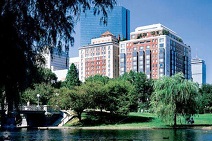 BOSTON—Owners of several Boston hotels are wisely investing in heat recovery systems to eliminate the inefficiencies inherent in the steam systems they use to heat their buildings. The result of their investments is annual savings of tens of thousands of dollars in energy, water and sewer costs, and a reduced carbon footprint.
BOSTON—Owners of several Boston hotels are wisely investing in heat recovery systems to eliminate the inefficiencies inherent in the steam systems they use to heat their buildings. The result of their investments is annual savings of tens of thousands of dollars in energy, water and sewer costs, and a reduced carbon footprint.
According to Alex Alexandrovich, president of Baker Engineering & Controls, Inc., Needham, Mass., commercial buildings—including hotels—in at least 17 U.S. cities and one in Canada receive steam from an outside provider to heat buildings. Condensate generated from the steam that is 212 degrees (F) must first be tempered with city water down to 140 degrees F before it is released into the sewage system. Not only is the heat from the steam wasted but water is also wasted in the cooling process. There are also sewage fees to pay.
“In essence companies are paying for the energy to heat it up and then paying for the water to cool it down before it can be discharged,” Alexandrovich says.
At the W Boston Hotel, which is heated by steam, Baker Engineering was called in to design and install a heat recovery system that captures heat from the condensate for reuse in preheating domestic water used in the hotel. Alexandrovich estimates the hotel will save about 15 percent on steam costs thanks to the heat exchanger. The savings in energy and water is expected to pay for the system in about two to two and one-half years. Installation was completed in November 2012 and commissioning was completed a month later.
Drainage Problems Created
Luke Fanuele, chief engineer, Sheraton New York Times Square, who was director of engineering at the W Boston during the condensate recovery system installation, said that before the reconfiguration of the condensate system, there were concerns about how much water was being dumped down the drain. It was even causing some problems with toilets, he says.
With the newly engineered system, the W Boston Hotel will save about 1.5 million gallons of water a year and $20,000 to $30,000 a year in sewer and water costs. An additional $10,000 in savings will come from the heat that is recovered.
At the Taj Boston, a condensate recovery system that Baker Engineering designed is almost 100 percent ready to go. Maureen Albright, director of engineering at the 86-year-old property, said she had been considering the system for quite some time. Previously, condensate gathered in a tank—a container Albright described as a “beast” to replace—where it was then tempered with cold water before being released into the sewage system. Now, that condensate is collected in a new holding tank where it will sit at 180 degrees before being run through heat exchangers to preheat water for domestic use.
In addition to working with Baker Engineering on the condensate recovery system, Albright and her team worked with Veolia Energy, the hotel’s steam provider. “There was a lot of logistics,” Albright said. “We had to make a few minor modifications in the boiler room. Nothing was negatively affected in the hotel.”
Huge Annual Savings
Albright says the Taj Boston will benefit from a 1,700 MLBs/year reduction in steam consumption, an annual savings of 2 million gallons of water, a reduction in sewage costs related to the 2 million gallons of water, and a yearly 150-ton reduction in greenhouse gas emissions. The entire system cost about $100,000 and will generate about $60,000 a year in savings.
“The rates for steam fluctuate,” Albright says. “If you get a cold winter, your prices will skyrocket. They quadrupled in the past year. It makes a lot of sense to reduce these costs.”
While the overall cost was about $100,000, Albright says Veolia Energy picked up most of those costs. “When it was time to renegotiate our contract [with Veolia], they got excited about the project. We worked it into the contract. It helped Veolia meet some of their own goals.”
Many Uses for Condensate & Its Heat
Jeff Hanulec, director of engineering at the Sheraton Boston, says condensate is used at his hotel as boiler makeup water. At another hotel where he worked, a pumping system was put in to pipe condensate to the loading dock area. There, it was used to warm up incoming water before it was heated.
“There are all sorts of things you can do with the water,” says, Hanulec, adding that it could even be used to heat pool water. “I am sure a lot of facilities are just cooling it and dumping it down the drain.”
With water and sewer rates increasing from 3 percent to 5 percent a year in the Boston area, Hanulec says it makes a lot of sense to maximize the use of condensate.
Glenn Hasek can be reached at editor@greenlodgingnews.com.






